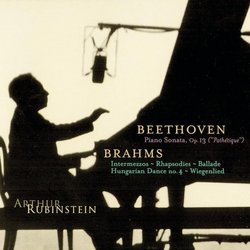| All Artists: Ludwig van Beethoven, Johannes Brahms, Artur Rubinstein Title: Rubinstein Collection, Vol. 10 Members Wishing: 1 Total Copies: 0 Label: RCA Original Release Date: 1/1/1946 Re-Release Date: 3/6/2001 Album Type: Box set, Original recording remastered Genres: Dance & Electronic, Pop, Classical Styles: Vocal Pop, Chamber Music, Forms & Genres, Ballads, Sonatas, Historical Periods, Classical (c.1770-1830), Modern, 20th, & 21st Century Number of Discs: 1 SwapaCD Credits: 1 UPCs: 090266301027, 090266301027 |
Search - Ludwig van Beethoven, Johannes Brahms, Artur Rubinstein :: Rubinstein Collection, Vol. 10
 | Ludwig van Beethoven, Johannes Brahms, Artur Rubinstein Rubinstein Collection, Vol. 10 Genres: Dance & Electronic, Pop, Classical |
Larger Image |
CD Details |
CD ReviewsA Song of Love Hank Drake | Cleveland, OH United States | 03/19/2001 (4 out of 5 stars) "All of the recordings featured on this CD originated as 78-RPM discs. This was the first of three recordings Arthur Rubinstein made of Beethoven's Pathetique Sonata. Although this performance contains many pianistic and tonal felicities, there are several issues which prevent it from being of the first rank. First, on a purely technical level, there is a distracting change of pitch at 3'11" during Track 1 (presumably this is where Side 1 of the original 78-RPM set ended and Side 2 began). Second, the piano is problematic as several unisons in the treble are not cleanly tuned. As for the performance, Rubinstein's approach here is somewhat episodic, lacking in the architectonic qualities which would come later. This version is certainly not bad, just not on the same level as Rubinstein's later remakes (Volumes 33 & 56 of the Rubinstein Collection) which also benefit from more realistic recorded sound. Brahms was alive until Rubinstein was ten years old, and those used to the traditional Germanic stodgy approach to Brahms are in for an awakening here. Rubinstein's Brahms is pianistically large-scaled, passionate and unabashedly romantic. Yet, he does not sacrifice musical common sense: phrasing, tempo, pedaling are all in order. Most of the items here were recorded in 1941, just before America's entry into World War II, which restricted further recordings. (Rubinstein was, in fact, performing Brahms' Piano Concerto No. 2 at Carnegie Hall when the Japanese were bombing Pearl Harbor.)The Brahms Hungarian Dance No. 4, Rhapsody in G minor, and Rubinstein's own arrangement of the Wiegenlied were movie tie-in recordings to coincide with the release of the film Song of Love in 1947. Quite a popular film its day (it starred Katherine Hepburn!), this biography of Robert and Clara Schumann also featured the music of Brahms. Rubinstein had the unique challenge of playing various works in the repertoire as he imagined Clara Schumann, Brahms, and Liszt would have played them. The performances here, with Rubinstein playing as himself, are along the same lines as the 1941 recordings, although the sound has slightly more body and dynamic range."
|
